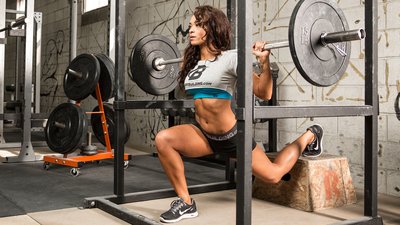You may have resolved to make this the year you finally start—and stick with—an exercise program, but you're fighting an uphill battle, and it's all too easy to give up after a few weeks. Judging by the fact that the January crowds in the gym are long gone by February, you're not alone!
The question is how to turn your determination into action you can sustain for more than 30 days. While this website is filled with hundreds of ways to help you make your training more effective, we can't actually come over to your house and light the fire that gets you moving. At some point, you must take action. No one can do it for you.
Let me assure you, I in no way want to write the companion article in February that implores you to get back to your workouts! So let's save us both a lot of time and stick with it.
Strategies For Starting Off Right
1. Define Your Challenge
Write down your ultimate physique goal and how you'd like to look. Include weight, body fat, and any physique improvements you'd like to see. Now divide it by 3. That's roughly your 90-day goal—to get you a third of the way there.

Write down your ultimate physique goal and how you'd like to look.
2. Make Time For Your Health
Work up to 60 minutes of physical activity each day. That doesn't mean you'll be on the weight-room floor seven days a week, but strive to get some kind of activity—even if it's a walk with your dog or a leisurely bike ride. Take advantage of great weather when it happens by taking your workouts outdoors. If you're new to fitness, start with two 15-minute sessions or three 10-minute sessions to help you become acclimated.
3. Discover What You Enjoy
Weights are one of the best ways to make significant physical changes to your body. Unfortunately, not everyone enjoys lifting. The most important determinant of long-term success with fitness is how much you enjoy an activity. Choose something that make fitness fun! Explore new exercise classes and activities to determine which you prefer. As a beginner, almost anything you choose will be challenging, but gains will be made starting your very first week.
4. Don't Go It Alone
Train with a friend who's at about your level of ability and has similar goals. You'll be far less likely to skip your workout when you know someone is depending on you. It's also more motivating when you push each other, and you'll be far less likely to cut your sessions short.
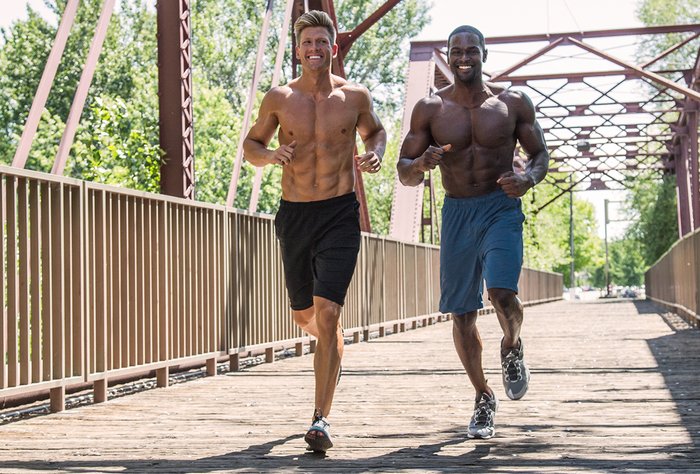
Train with a friend who's at about your level of ability and has similar goals.
5. Be Around People Whose Goals Align With Yours
Friends can help in other ways too. Surround yourself with five new friends at the office, school, or in your personal life who are committed to health and fitness. People who choose healthy lifestyles will engage in behaviors that will rub off on you. Similarly, if your friends are just the opposite, they'll likely reinforce the wrong kinds of behaviors.
6. Avoid Comparing Yourself To Others
Instead, compare yourself to you of last week. If you make every week better in some way than the preceding week, you're moving forward and making progress. Aim to improve yourself 5-10 percent versus last year's version of you. It's hard for any of us to feel good about ourselves when we try to measure up to physique athletes who may have been training for a decade or more. What these champions have in common with you is that they decided to improve their fitness one day, and then came back for a second, and kept going.
7. Read To Get Motivated And Learn
An easy way to get inspired and increase your knowledge of fitness, training, and nutrition is to commit to reading one online fitness article each day. Thousands of such articles cover a huge number of areas on this site alone! You won't know everything there is to know in a week, but knowing a little more every day helps you better understand the what, why, and how of what you're doing. Here's a starter's guide to fitness terms that'll help you find your way around the gym. Just be aware there's a ton of garbage advice available on the Web, so stick to sites you trust.
8. Embrace Physical Challenges Outside Your Comfort Zone
We all want to live comfortably, but workouts produce the best results when they make a little—or even more than a little—uncomfortable. Your body adapts to changes when you ask more of it than it's used to giving. To make improvements, you must push just outside your comfort zone. Adjust your mindset to seek greater challenges over time, and you'll see your body respond.
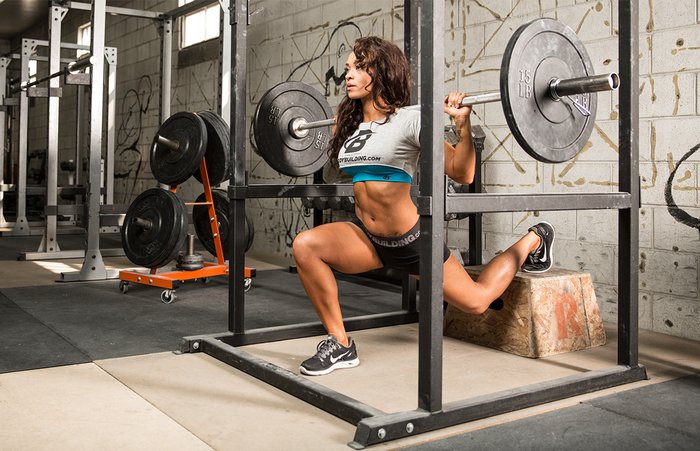
To make improvements, you must push just outside your comfort zone.
9. Don't Rush To Self-Judge
Many individuals will drop out of their training program because they're not seeing results fast enough. However, physiological adaptations occur incrementally. You most likely won't see much—if any—improvement from one week to the next, but you surely will over 90 days. That's why you should make an iron-clad commitment of at least three months when starting any exercise program. Only then should you compare before-and-after pictures and measurements.
10. Enter A 90-Day Transformation Contest
Want to see the greatest changes in your physique possible? Dive into a transformation contest! Don't do it for the money; do it for the personal challenge. Going all-in and attaching a deadline provides daily motivation that can become self-perpetuating. Countless people have used this method to achieve incredible results, and so can you! Our site offers transformation contests every year for individuals of all levels, which you can find more about here.
11. Get On A Roll
Any fitness enthusiast will tell you that it's easier to stay on track when you've already been following a successful program. Success breeds success. In contrast, it's much easier for beginners to fall off the fitness wagon, precisely because they've got so little invested. As you improve and see physical changes taking place, you'll be even more motivated to continue. That's why those first few months are so important, why you need to keep pressing forward even when your mind would rather be on the couch. Buy into a training program for at least three months before evaluating. Only then can you reasonably assess your progress.
12. Slow And Steady Wins The Race
Ever heard the adage that life is a marathon, not a sprint? Well, the same goes with your fitness. Doing a four-hour workout in hopes of shaping up faster can do more harm than good—and who in their right mind wants to spend four hours in the gym, anyway? Take a more balanced approach to fitness. Commit to working out an hour a day. Your results will be better, and you won't get burned out.

Take a more balanced approach to fitness. Your results will be better, and you won't get burned out.
13. Rehab Your Injuries
If you've got a physical condition that limits your activity, schedule an appointment with a sports-medicine doctor or physical therapist. They can help rehabilitate the issues with various exercises. Equally important, they can teach you to modify your training so you can still exercise safely.
14. Rise, Then Shine
Work out in the morning, before the rest of the day gets in your way. Bonus: Nailing a morning workout boosts your confidence for the rest of day.
15. Get Off Your Duff At Work
Sedentary jobs are associated with greater risk for cardiovascular disease, not to mention an extra inch or two around the middle (and those two things are closely related).[1,2] Incorporate some kind of movement every 30 minutes or so at work. At BodyBuilding.com, you'll see small groups of employees walking the building's grounds throughout the day. Find other ways to break up long periods of sitting at your desk—even if it's just delivering a message to a coworker in person rather than by email. Keep moving!
16. Adjust Your Schedule To Minimize Midwinter Blues
We all feel the midwinter blues, especially those of us at northern latitudes. Personally, for whatever reason, I'm simply not motivated to train when I get off work and it's already dark outside, so I train in the morning or on my lunch break. While it may lengthen your lunch period, ask your boss if you can work late to make up for it.
17. Skip The Pre-Workout Stretch
I did not say, however, to skip the warm-up. Too many trainees consider stretching to be a pre-workout activity, when it's best saved for the end. However, 5-10 minutes of cardio helps elevate your heart rate and increases circulation. You can even do some dynamic exercises as part of your warm-up as well. But that's not the end of your warm-up; don't forget to do several very light sets of your first exercise. Now you're ready to tackle the weights with reduced risk of injury. You'll be stronger, to boot.
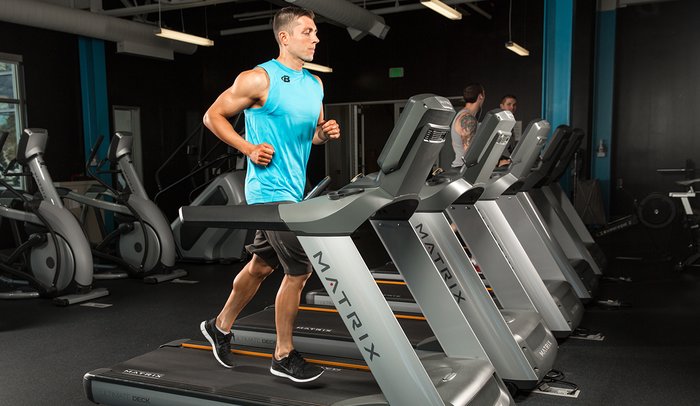
5-10 minutes of cardio helps elevate your heart rate and increases circulation.
18. Skip The Post-Workout Sauna
When you sweat after an intense workout, your body is cooling itself down. Subjecting yourself to an environment of extreme heat to "remove toxins from the skin" only subjects you to increased risk of hyperthermia, in which your body temperature can rise dangerously. Likewise, skip the post-workout Jacuzzi unless your body has had ample time to cool down.
19. Dine In Restaurants Only Once A Week
You consume more total calories when you eat out, and many of those calories will be empty, in the form of sugary beverages and desserts. You won't be tempted to indulge during a weak moment if you're eating at home and no junk food or soda is present.
20. Try A New Recipe For A "Clean" Meal Once A Week
Not everyone loves to cook. However, anyone can turn simple recipes into tasty meals that are clean and loaded with protein by starting with our Recipe Database, which lists more than 1,400 healthy and clean recipes.
21. Treat Yourself To A New Kitchen Gadget
Buying a new toy for your kitchen will make eating clean foods more pleasurable. Using the right tools can cut down on the time you spend in the kitchen, and save you money in the long run. Here are eight must-have kitchen gadgets you'll want around.
22. Try A New Veggie In The Produce Section Of Your Supermarket Each Month
Besides being loaded with fiber, most veggies are also low in calories and packed with micronutrients. Here are three every athlete should be eating.

Besides being loaded with fiber, most veggies are also low in calories and packed with micronutrients.
23. Choose Slower-Digesting Carbs Over Fast-Digesting Ones
Slow-digesting carbs such as brown rice, whole grains, yams, sweet potatoes, and quinoa provide more sustained energy throughout the day and should make up the bulk of your carbs. Fast-digesting carbs like sugar and white bread can spike blood sugar levels and increase the insulin response. Save these for your post-workout meal, when your body can use the extra carbs to replenish fuel stores and prevent them from being stored as fat. And don't forget to keep carb-laden drinks in check!
24. Make A Healthy, Low-Fat Food For Your Next Potluck
Company potlucks are minefields of sweets and other nutritionally unbalanced foods. So start by putting a few healthy options on your plate with the intention of coming back a second time, which allows the first foods to start filling you up. It sure beats the "I'll have one of everything" approach that many people use at potlucks.
25. Stop Buying Halloween Candy You'd Like To Eat Yourself
If you've got a sweet tooth like me, don't buy any Halloween candy ahead of time and expect the bag to still be full by October 31. Better yet, select candies that you really dislike, so you won't be tempted to indulge—even if you have leftovers.
26. Don't Give Sweets As Gifts
Don't encourage others to eat Costco-sized Valentine's or Easter sweets; they may just return the favor.
27. Limit The Damage Of A Late-Night Snack Attack
Midnight munchies can foil hard-earned efforts during the day, so don't give in to temptations like these five worst choices. Good choices before bedtime include cottage cheese, hard-boiled eggs, deli meat, and nuts. If you're searching for something sweet, reach for antioxidant-rich fruits such as strawberries, raspberries, blueberries and citrus fruits, especially grapefruit.
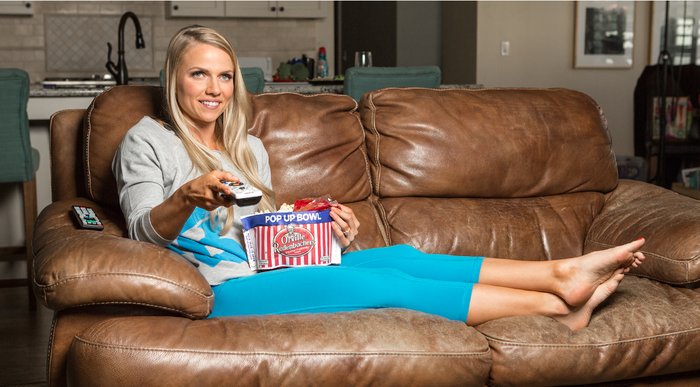
Good choices before bedtime include cottage cheese, hard-boiled eggs, deli meat, and nuts.
28. Do Your Monday Workout On Sunday
Besides not having to fight the after-work crowds—and we know that can be a real headache—you'll have the whole gym to yourself to use whatever equipment you please, even for supersets! Plus, you'll be one day ahead on your workout schedule.
29. Go Mobile!
No matter your fitness goal, your level of experience, or available equipment, Bodybuilding.com All Access has the workout plan for you. Through BodyFit Elite, you'll find exercise plans that can help you lose weight, build muscle, or improve your performance.
30. Realize Big Muscles Doesn't Equate To Being Fit
Fitness is about more than big muscles. Flexibility, cardiorespiratory fitness, muscular strength and endurance, and body composition are elements in determining how fit you really are, and there are activity and exercise prescriptions for each one of them. Ultimately, a balanced approach that addresses each item is essential to being truly fit.
31. Wash Your Hands Before Leaving The Gym
Great, your workout's over, and you crushed it. But consider that you've just touched numerous plates, handles, dumbbells, pins, benches, and machines—the same apparatus that other gym members have contaminated with a cold, flu, conjunctivitis, or other airborne disease. The gym environment is warm and humid, and bugs are easily spread. Kill them with soap and hot water.
32. Get A Heavy Dose Of "Vitamin L"
Watching the news today can be totally depressing, and that's on top of your own set of problems. So laugh as often as you can. My favorite comic relief is watching reruns of "The Big Bang Theory," but there are any number of comedy shows you can easily download to lighten the mood. Just make sure you turn everything off at least 45 minutes before bedtime—and that includes your phone.
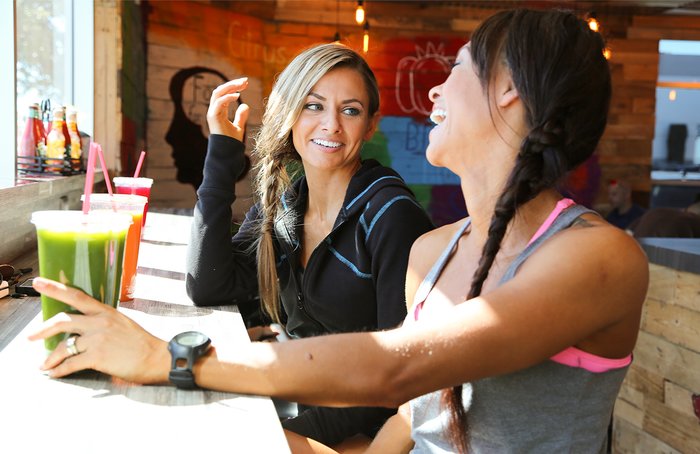
Laugh as often as you can.
Muscle-Building Strategies
33. Focus On Form First
If you're working out with weights, the single-most important factor early on is learning how to use proper form—not lifting as much weight as possible! Most gyms offer an initial training session with a personal trainer when you sign up for a membership; study up on those exercises, or peruse a beginner's routine from the Bodybuilding.com library.
Good form ensures the proper muscle groups are targeted and reduces the risk of an injury. Just watching how somebody else does a movement in the gym is like Russian roulette: sooner or later, you're going to pick up bad form. This site contains photos and videos on how to do hundreds of exercises right in the Exercise Database.
34. Use Math To Build Muscle
Commit this fundamental process of muscle building to memory. You train given muscle groups by subjecting them to an overload and volume (sets + reps) of work they're unaccustomed to. That's the training stimulus. However, the microdamage to muscle fibers takes a few days for repair and growth, and it requires good nutrition (especially protein and carbs) and recovery, so what you eat and how you rest are important in the muscle-building equation. You do not build muscle in the gym; that's only where you initiate the muscle-building process!
35. Start With Machines, Beginners
Learn movement patterns on machines first, and then try to duplicate them with barbells and dumbbells. Once you're in proper position on a given machine, the machine balances the weight for you, which is much easier to control. Free-weight movements are harder to control because there's no predetermined path that the weight must follow.
36. Learn The Basic Multijoint Movements
The best mass builders are the basic multijoint exercises, which you should be focusing on during your training. "Multijoint" simply means that more than a single pair of joints—and the muscles that attach to them—are at work. For example, when bench pressing, your shoulder and elbow joints are involved, which recruits your chest, delts, and triceps. These types of exercises have been shown to be superior for developing muscle mass by increasing the muscle-building hormonal response. Single-joint exercises don't deliver near the same muscle-building pop.
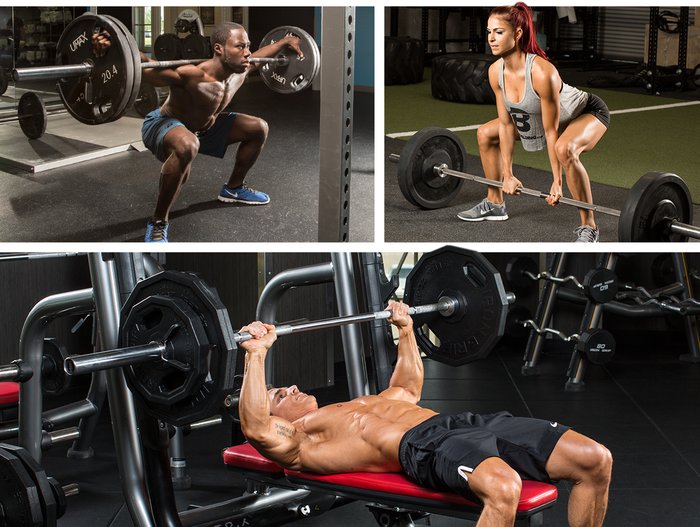
The best mass builders are the basic multijoint exercises, which you should be focusing on during your training.
Focus your workouts around bench presses, squats, deadlifts, overhead presses, and rows. They can and should be the foundation of your routine, done early in your workout with challenging weights.
37. Choose The Right Rep Target And Weight
If you're looking to add size, choose a weight that barely allows you to complete 8-12 reps with good form on each set. That's the range exercise scientists identify as being the best for building muscle. If you can do more than 12 reps, add weight so that you'll be doing fewer reps. If you can't reach at least 6, reduce the weight a bit. Simple, right?
38. Turn Up The Volume—On Your Sets, Reps, And Load
There are a number of variables that affect muscle growth, like exercise selection and rep range (which relates to "intensity") but another one is volume. That's the number of sets x reps x load per body part. Though you won't be doing much total volume as a beginner, you'll be adding exercises and sets over time for each muscle group. Higher-volume, multiple-set protocols consistently have been shown to be superior over single sets when it comes to building muscle.
39. Rest 60-90 Seconds Between Sets
Because muscle growth is determined in part by the accumulation of substances that build up over the course of your workout, taking rest periods that are too long allows them to dissipate. But cutting your rest periods too short means your body won't be recovered sufficiently. That's why exercise scientists recommend that you take about 60-90 seconds between sets.
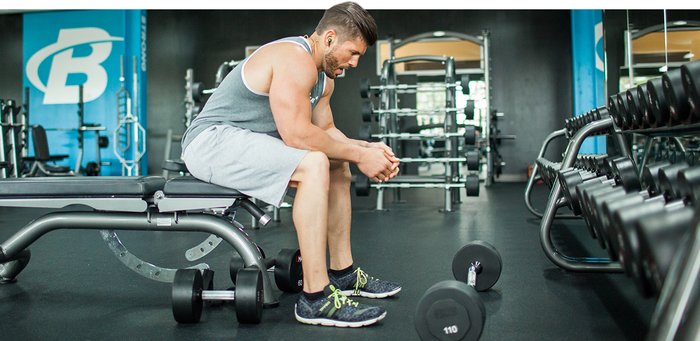
Cutting your rest periods too short means your body won't be recovered sufficiently.
40. Know When To End A Set
Though as a beginner you should focus on learning movement patterns and controlling the weight, as you gain experience, you should learn how to take your training close to what's called "muscle failure." That's when you can't complete any more reps on your own with good form. Training to failure is important in building muscle because it's been shown to create a greater anabolic stimulus than training below this threshold.
41. Follow A Plan
As you can see, there are a number of variables to consider when designing a workout program. Initially, it's hard to understand them all, so it's easier to just follow one of the beginner workouts we've created that closely matches your time commitment, goals, and level of ability. Knowing exactly what you want to do each workout—and why you're doing it—will push you in the right direction better than walking into a gym and following a random approach to your training. Few people find their destination by instinct; following a roadmap will help you get to yours.
42. Master The Art Of The "Negative"
Lowering the weight is called the "negative rep," and when you become more advanced, you'll learn techniques focused on the negative that can help produce better size and strength gains than when you focus just on the positive. For the time being, simply lower the weight under control. Never let it just drop in an uncontrolled manner. And never rest in the bottom position.
43. Use An Athletic Stance When Doing Standing Exercises
In this position, your feet are about shoulder-width apart, toes pointed slightly outward, knees unlocked, and torso erect (chest out, shoulders back, low back slightly arched) with your head looking forward. This is a natural, stable, and strong position, and it should be a starting point for you when getting into position for almost any standing movement.
44. Focus On Building A Balanced Physique, Not Just The Mirror Muscles
Many guys focus on the so-called mirror muscles—chest, arms, and abs. Over the long term, that can lead to strength imbalances, posture problems, and increased risk of injury, not to mention ridicule. Training legs is hard work, and working back isn't necessarily sexy, but these two muscle groups in particular are among the body's largest and will help you burn more total calories when you train them.
45. Start With A Whole-Body Workout
One of the simplest ways to ease into a weight workout is to do a whole-body workout three times a week with a day of rest in between for recovery. A whole-body workout hits these major muscle groups: glutes, quads, hamstrings, chest, back, shoulders, triceps, biceps, abs, and calves. Choose one exercise for each muscle group (multijoint exercises hit multiple body parts), training every other day.

One of the simplest ways to ease into a weight workout is to do a whole-body workout three times a week with a day of rest in between for recovery.
46. Start "Splitting" As You Gain Experience
As you gain experience in the gym, start adding more exercises and sets (volume) for each body part for better overall development. Rather than just doing longer workouts, start dividing your training into a split, such as push muscles (chest, shoulders, triceps) one day, pull muscles (back, biceps) on another, and legs on a third. Given the greater overall volume you do each session for those individual muscle groups, you'll also need a longer recovery session before repeating that workout again.
47. Customize Your Supplement Stack With Proven Winners
While there are dozens and dozens of products to choose from, start with these:
- Caffeine, which energizes you when you're feeling tired and allows you to stay focused and do more work in the gym
- Creatine, which allows you to push heavy loads for more reps and has been shown to boost size and strength gains
- Whey protein, which boosts anabolism so you'll improve muscle building
Once you have those basics in your gym bag, you can more about the best supplements for strength training and bodybuilding or athletic performance. You'll ultimately want to tailor your supplement choices to your goals and your budget.
Fat-Loss Strategies
48. Gain Knowledge To Lose Weight
If you're looking to lose weight in 2020, you have thousands of resources to choose from for advice, but not all of them are evidence-based and legit. We not only want you to do it right, without any gimmicks, but safely as well. Check out Bodybuilding.com's Foundations of Fitness Nutrition course to learn the essentials of eating right for any goal, including weight loss.
49. Find Inspiration That's Just A Click Away
Read a transformation success story on Bodybuilding.com, like Jesse Shand's. He's lost over 450 pounds with the help of the Bodybuilding.com community members. What's your excuse, again?
50. Post Your Selfies Where You'll See 'Em
Post a "before" pic of yourself on the fridge where you'll see it every time before you open the door. Sometimes you need a little reminding of what you want to lose before choosing the foods you want to eat.
51. Connect With Others Via Social Media
Posting your progress photos and engaging with like-minded folks can be incredibly motivating. Many of them are going through their own weight-loss journeys and are a great source of real-world tips.
52. Eat Before You Go Shopping
Never do your grocery shopping when you're hungry! You're much more likely to put nutritionally empty foods and snacks in your cart, or to buy more food than you need.

Never do your grocery shopping when you're hungry!
53. Just Say No To Sugary Drinks, Teas, And Sodas
Americans consume almost 20 percent of their daily calories via liquids, so if you're struggling with your weight, here's a golden opportunity to cut a bunch out.[3] Drink flavored waters that contain BCAAs or a squirt of Mio or Crystal Light.
54. Measure Your Desserts In Minutes
When it comes to ordering a dessert in restaurants, make the conversion from dollars to minutes. That is, if a dessert cost $7.50, think instead of the amount of extra work you'll have to do burn it off. Though imprecise, use this very rough calculation: Multiply the price in dollars by 10 and cut that number in half—that's the number of minutes you'll have to do to burn it off. The "price" of indulging in dessert is never what you pay for it. That $7.50 item will cost you 375 minutes of extra work. Still tempted?
55. Log Everything You Eat
Record everything you eat for a week, whether it's in a food diary or an app like MyFitnessPal. You'll begin to think more carefully about your food choices, which should help you eat substantially fewer calories.
56. Know That High-Rep Weight Workouts Aren't Better For Fat Loss
Weight training is an essential component of weight loss, but it would be a mistake to think that doing high-rep sets with light weight is the best way to burn off extra calories and fat. Muscle is a metabolically active tissue, meaning it burns off loads of calories all day long, even when you're at rest. To build as much muscle tissue as possible—or even to keep it when dieting—train with moderately heavy weights in the 6- to 12-rep range. And stick with the multijoint exercises for the majority of your movements.
Studies have also shown that intense, moderately heavy lifting of this sort has the greatest effect on keeping your metabolism elevated for as long as 24 hours after your workout has ended.[4] That significantly adds to the total number of calories burned!
57. Do High-Intensity Interval Training
To lose body fat, you need to burn more calories than you consume. Doing cardio is one way to widen the caloric deficit. But not all cardio strategies are created equal. In fact, research is beginning to show that high-intensity interval training (HIIT), in which you alternate periods of very fast activity with slower recovery periods, can be more effective at reducing body fat than other types of exercise.[5] Not only does HIIT blast through calories in a shorter amount of time, the totals are amplified by the EPOC effect long after you've left the gym.
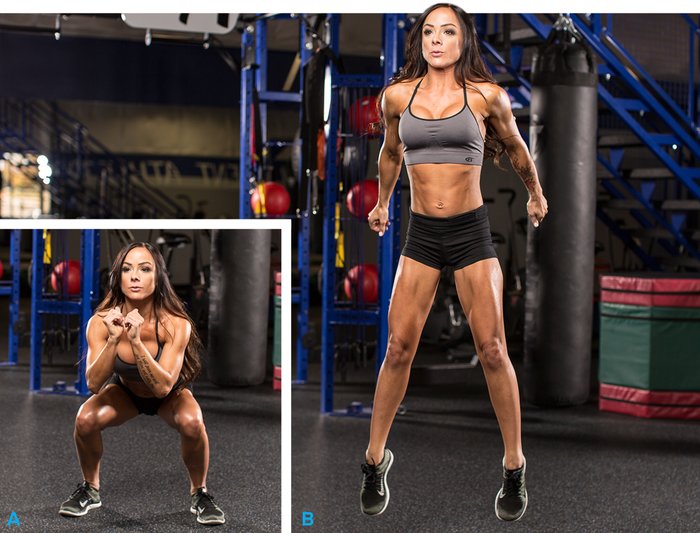
Jump Squat
You likely won't be able to start off by doing HIIT, but as your cardiovascular fitness improves, incorporate short bouts of near-maximal cardio activity (say, for 30-60 seconds) and alternate then with less-intense recovery intervals (30-60 seconds). Your heart will thank you, too.
58. Use Supplements To Boost Energy And Increase Fat Loss
No they won't peel off fat if you're just sitting on the couch, but metabolism-boosting and energy-enhancing supps will help you go further in your training and preferentially tip the scales to greater fat burning. They should be combined with the right kind of fat-loss program and calorie-deficient diet. Here are our picks for the best fat-loss supps.
59. Do Five Things Every Day To Help You Burn More Calories
The specifics are less important than this simple truth: When you burn an extra handful of calories five times a day, you're in a better position to reach your fat-loss goal while improving your fitness. Some examples:
- Take the stairs
- Park farther away in the lot from your destination
- Walk instead of taking the car
- Sweep the garage or do some gardening
- Take a walk on your break at work
- Bike to the gym and back
60. Make A Fitness Date
Take a date or significant other out for a bike ride or go bowling. Having fun together doesn't mean you have to go to a restaurant or movie, where the main offerings are all nutritional minefields. You'll make a better impression by doing something different, and get in a little extra exercise as well.
61. Take A Walking Tour
Nothing's more exciting than visiting a new city. So why take a taxi or subway when you can soak up the local color by spending an afternoon on a walking tour? Surf the Web for suggestions—and be sure to pack your sneakers.
References
- Katzmarzyk, P. T., Church, T. S., Craig, C. L., & Bouchard, C. (2009). Sitting time and mortality from all causes, cardiovascular disease, and cancer. Medicine and Science in Sports and Exercise, 41(5), 998-1005.
- Mummery, W. K., Schofield, G. M., Steele, R., Eakin, E. G., & Brown, W. J. (2005). Occupational sitting time and overweight and obesity in Australian workers. American Journal of Preventive Medicine, 29(2), 91-97.
- Chen, L., Appel, L. J., Loria, C., Lin, P. H., Champagne, C. M., Elmer, P. J., ... & Caballero, B. (2009). Reduction in consumption of sugar-sweetened beverages is associated with weight loss: the PREMIER trial. The American Journal of Clinical Nutrition, 89(5), 1299-1306.
- Schuenke, M. D., Mikat, R. P., & McBride, J. M. (2002). Effect of an acute period of resistance exercise on excess post-exercise oxygen consumption: implications for body mass management. European Journal of Applied Physiology, 86(5), 411-417.
- Boutcher, S. H. (2010). High-intensity intermittent exercise and fat loss. Journal of Obesity, 2011.

